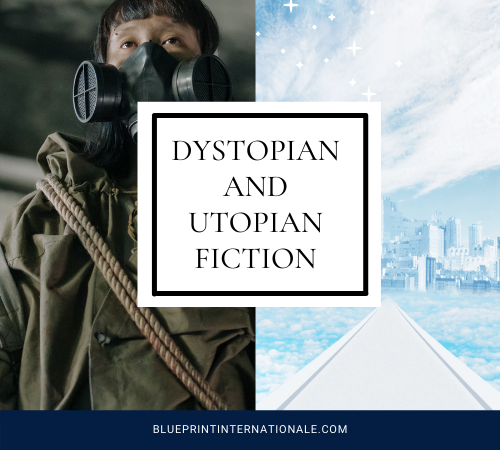Dystopian and utopian literature has been one of the most popular genres in entertainment for years. However, because of its breadth and diversity of forms, the dystopian and utopian genre may be difficult to classify at times. What exactly are dystopia and utopian fiction? What distinguishes it, and how can its continuing appeal be explained? This article will define dystopian fiction and utopian fiction, explain their purpose and function and give significant examples from many narrative genres.
Dystopian vs. Utopian
We’ve all watched films or read novels about how the world as we know it is going to end. Each case depicts a distinct technique of global dominance. In other instances, ray gun-wielding aliens with gigantic heads conquer the earth and install their giant insect-like queen on the White House throne. In others, prime-time television gradually brainwashes the world’s people into becoming dull-witted slaves to evil multinational corporations. These novels and films all have one trait: they are all dystopias.
Simply put, a dystopia is a horrible place, a place where no one wants to live, a place where one’s rights and liberties are taken away, and a place where the environment is destroyed. Dystopia originated from the Greek prefix “dys,” which translates as “bad, harsh, or wrong,” and the Greek root “topos,” which translates as “place.”
The terrible place is more than a location in literature, such as Aldous Huxley’s Brave New World, or in films such as The Matrix. The dystopia serves as a vehicle for an author’s dramatic commentary on contemporary life. Thus, dystopian literature is often written so that it serves as a warning to us – to either stop doing what we’re doing or face the consequences.
You may be wondering what distinguishes dystopian fiction from fairy tales or horror novels. The distinction is that a dystopia is more than a tale about an individual behaving poorly in an otherwise normal environment. Everything in a dystopia is centered on one terrible concept, from minor people to location and beyond.
The protagonist is an outsider in this society and is often the only one who sees its flaws. A dystopia’s polar opposite is a utopia. Thomas Moore created the term “Utopia” for his 1516 novel Utopia, which described a fictitious island in the Atlantic Ocean. It is a pun on the Greek prefixes “ou,” which means ”no “ or ”not,” and “eu,” which means “good.”
Thus, a utopia is literally “a nice place” and “no place,” implying that it is ideal yet does not exist and will not exist. A location, situation, or condition ideal in terms of politics, laws, customs, and circumstances. Additionally, utopias may be described as a perfect community or civilization with an excellent socio-political and legal framework. The phrase has been used to both deliberate groups attempting to establish an ideal society and fictitious civilizations depicted in literature.
Dystopian
Types of Dystopian
The majority of dystopian novels depict a future in which repressive social control and the appearance of a flawless society are maintained via one or more of the following control mechanisms:
- Bureaucratic Control-A mindless bureaucracy exerts control over society through a maze of red tape, endless rules, and power-hungry government employees.
- Corporate Control-Through goods, advertising, and the media, one or more major companies exert influence over society.
- Religious/ Philosophical Control-Society is frequently ruled by a dictatorship or theocratic regime based on philosophical or religious philosophy.
- Technological Control- Technology—through computers, robotics, and scientific means—controls society.
Dystopian Society Characteristics
- Propaganda is used to supplant education and to exert control over society.
- Citizens are believed to be constantly monitored.
- Information, the autonomy of thinking, and liberty are all limited.
- Citizens live in a condition of dehumanization.
- Citizens must adhere to standardized expectations. Individuality and disagreement are undesirable characteristics.
- Citizens are fearful of the external world.
- The natural world is shunned and reviled.
Utopian
Types of Utopian
- Ecology– Return to Nature – people coexist with nature and oppose industrialization.
- Economics– Money is eliminated, and people are free to pursue their passions.
- Humanism– Beliefs that emphasize the worth and goodness of human beings and seek to treat everyone equally.
- Politics– The ruling body is just, equitable, and helpful to its constituents.
- Religious Beliefs– Established religious beliefs serve as a direction for people’s behavior and structure.
- Science and Technology-Science, and Technology are welcomed and improve our lives; living is simpler, more convenient, and healthier/live longer.
Utopian Society Characteristics
- The government is peaceful and benevolent.
- Access to education, job opportunities, healthcare, etc.
- Citizenship Equality.
- A secure, hospitable atmosphere.
- Citizens are free to think for themselves.
In contrast to dystopias, utopias may be harder to define. Writers of utopian fiction often find themselves in a pickle: the ideal location for one person is seldom the ideal place for everyone. As a result, the word “utopian” may be used negatively outside of the literary field to refer to a notion or viewpoint that is relatively naïve and idealistic. There would be no strife if a paradise were ideal for everyone (which would make a pretty dull story). On the other hand, a dystopia usually appeals to a broad audience because it plays on our most primal fears – the loss of life, liberty, and happiness.
Summary
- Dystopian takes place in a severely despotic society that is often afflicted by tight control, brutality, disorder, indoctrination, and other unpleasant aspects.
- Utopian takes place in a frequently portrayed civilization as sophisticated, joyful, clever, or even flawless or problem-free.
Finding the right company that offers quality and affordable book marketing and publishing services is easy with Blueprint Press Internationale. Pick up your phone and dial (888) 617-8289 to know more. You can also go to blueprintinternationale.com for more details.




